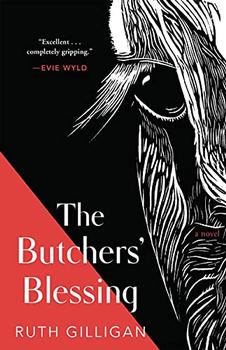Summary | Excerpt | Reviews | Beyond the book | Read-Alikes | Genres & Themes | Author Bio

A Novel
by Donal RyanThe Spinning Heart opens with the unique voice of Bobby Mahon, who was a respected construction foreman in his Irish village. His life is on a more uncertain footing now that the property market, once a mainstay of the Irish economy, is in freefall after the financial crisis of 2008 (see 'Beyond the Book'). Bobby seems like a man of contradictions: the fact that he hates his father and wishes him dead might suggest he is heartless, yet he is rapturously uxorious about his beloved Triona and regrets the desperate situation of his former workers, now unemployed.
The novel (though "novella" might be the more appropriate term for a book of just 160 pages) is a chorus of twenty-one first-person narratives, including Bobby's. Ryan features representatives from every sector of the community: an old woman, a little girl, a Russian immigrant, a single mother, a police officer, a schizophrenic man, and so on. The book triumphs at giving each character a distinctive voice, varying by level of diction, thickness of Irish dialect, staid or gossipy tone, and each person's particular preoccupations. So, for instance, we quickly learn that Millicent is a child because she writes that her father "looked sad on his face," while Brian's academic background is reflected in his use of vocabulary like "construct" and "dichotomy."
The book's context may not be immediately apparent, but it starts to fit together like a jigsaw puzzle as each voice elaborates on the town's problems. Single mother Réaltín lives in a near-empty housing development whose builders profited from the property boom but soon ran out of funds. Now she, her son Dylan, and one old woman named Dorothy rattle around an eerily sparse neighborhood. Meanwhile, Kate, who runs the local daycare center, reveals that the closure of a nearby Dell factory has been another terrible economic blow.
This post-crash neighborhood is a rather depressing place, only exacerbated by investigations into two crimes: a murder and kidnapping that together involve many of the characters. Indeed, "Since midsummer things are gone pure haywire," the policeman explains. Although readers learn who is culpable in each case, the whodunit element is much less important than the insights into the soul of a village and its disparate residents.
There may be twenty-some characters, but Bobby is the clear protagonist, and we understand him better through others' observations. "People always saw what they wanted to see in Bobby," Triona says. And indeed, several characters spend time pondering Bobby's nature. Rory confesses, a bit sheepishly, that as an adolescent he asked himself not what Jesus would do in a given situation, but what Bobby would do. Brian grudgingly admits, "[Bobby's] not the brightest star in the firmament, but he's a proper man," while Lily asserts, "He got all his mother's goodness, that boy. He got no part of his father that I can see."
That question of parental inheritance forms one of the novel's central themes. A father wonders "Who's to blame when a child turns rotten…His nature and his nurture were both down to me," while his daughter muses on "that delicate balance between love and shame" that can characterize parent-child relationships. Fathers and sons are particularly prominent; the book begins and ends with the uneasy link between Bobby and his father.
Irish slang and speech patterns lend The Spinning Heart a slight run-on, stream-of-consciousness element such as one finds in the works of Irish writers like Anne Enright, Colm Tóibín, and even James Joyce. This may, at least initially, present a challenge to non-Irish readers. Dialect words like "foostering" (wasting time) and "wan" (a derogatory term for a woman) will have some hoping for a glossary. You may be able to hear these heavily accented voices clearly in your head; whether you can understand them, however, is another matter. Nevertheless, fellow Irish author Sebastian Barry has made a case for such writing, suggesting, "It is exciting to be closed out for a moment from your own language" and proposing that Ryan's work "would benefit from being read out loud."
Although the novel's multiple voices – including one terrific posthumous one – are a virtuosic achievement, I would gladly give up half of them to have the remaining characters interact more, with several sections each. Some voices blend into or repeat each other, whereas I wanted to hear more from others, especially Vasya, the clownish construction worker from a remote reindeer-herding region of Siberia, who hides his tragic history.
"I can see her point of view," one character says about another, and this is where Ryan excels: in capturing the full range of viewpoints in this community. The novel's last line – "What matters only love?" – is peculiarly unpunctuated. Its meaning remains somewhat vague, but perhaps one might take it as a defense of the primacy of love: Could it be that despite all the divisions during this downturn, despite that possibly mocking symbol of the spinning heart on Bobby's father's gate, love is still all that really matters?
![]() This review
first ran in the March 5, 2014
issue of BookBrowse Recommends.
This review
first ran in the March 5, 2014
issue of BookBrowse Recommends.

If you liked The Spinning Heart, try these:

The End of the World Is a Cul de Sac
by Louise Kennedy
Published 2024
Brilliant, dark stories of women's lives by "a very major talent" (Joseph O'Connor, Irish Times)

by Ruth Gilligan
Published 2021
Set in the gothic wilds of Ireland, The Butchers' Blessing is a haunting and unforgettable thriller brimming with secrecy, tradition, and superstition.
Your guide toexceptional books
BookBrowse seeks out and recommends the best in contemporary fiction and nonfiction—books that not only engage and entertain but also deepen our understanding of ourselves and the world around us.